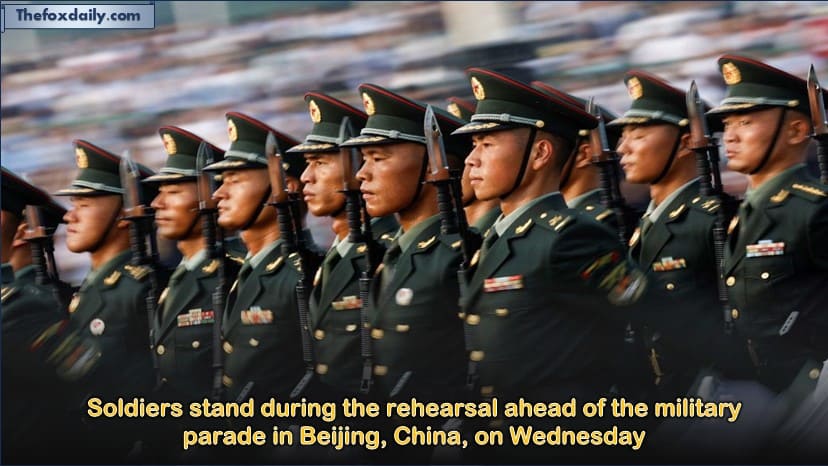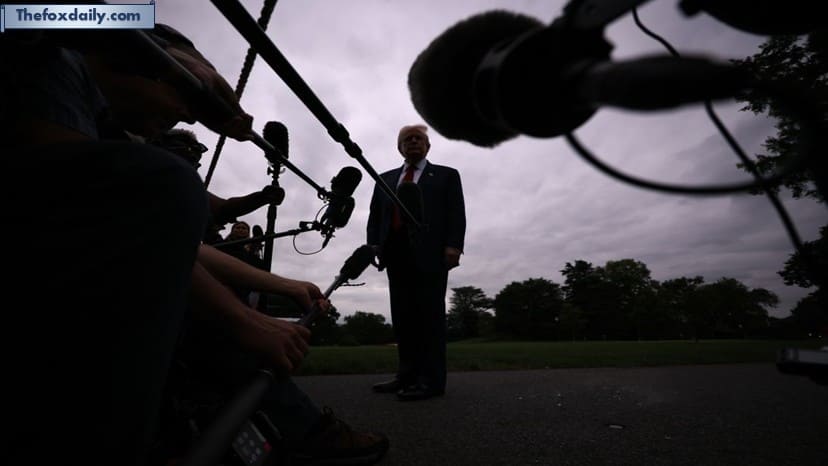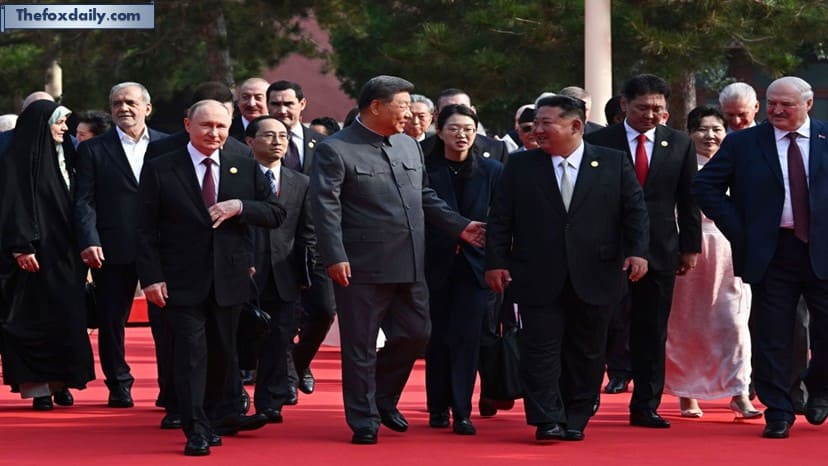
The fact that china is hanging around with his strongman buddies has angered President Donald Trump.
As television images showed Chinese leader Xi Jinping entertaining the totalitarian leaders of North Korea and Russia at a spectacular military parade in Beijing late Tuesday night (US time), Trump exploded on social media.
Trump wrote to Xi, “Please give my warmest regards to Kim Jong Un and Vladimir Putin as you conspire against the United States of America.”
If China’s two large gatherings of authoritarian leaders, US foes, and former friends this week were meant to be a personal jab at the US President, it worked flawlessly, according to the Truth Social post that went viral. It also highlighted the pointlessness of his attempts to use his art-of-the-deal charms on the real world’s harsh men and his assertions that his ostensibly intimate connections with these leaders can make all the difference.
Last month, Trump and Putin met in Alaska, but despite his lavish red carpet greeting, no progress has been made to settle the conflict in Ukraine. By intensifying attacks on civilians and delaying negotiations with President Volodymyr Zelensky, Putin has betrayed Trump’s expectations. Summits between the US president and Kim during his first term also failed. Prior to participating in Trump’s photo-op diplomacy, the North Korean leader possessed fewer nuclear weapons than he has now.
In his online outburst, the president continued by pointing out that Americans had lost a lot of people in the fight against imperial Japan, whose defeat was commemorated in Beijing on Wednesday for the 80th time.
In China’s pursuit of glory and victory, many Americans lost their lives. For their bravery and sacrifice, I hope they be duly honored and remembered. Trump wrote.
China’s massive celebration coincides with a dangerous global moment as the emerging Asian superpower looks to take advantage of Trump’s unpredictable foreign policy, which has damaged America’s standing as a trustworthy major power.
The irony of Trump’s rage stemmed from the performative spectacle he enjoys, which has been taking place in China in recent days.
However, the anti-Western powers’ meeting in Beijing and Tianjin is about more than just trolling. It’s a precursor to the possibility that Trump’s second-term policies, which center on “America First” nationalism, bullying of weaker nations, and tariff pressure, may backfire.
Jackie S.H. Wong, an assistant professor of international studies at the American University of Sharjah, stated on media’s “Connect the World” Tuesday that “China is leveraging the missteps or mistakes that the US (is making).”
“We remain unfazed.”
Some of the alarmist rhetoric on Russia and China forming a new anti-US axis is exaggerated. In contrast to organizations like NATO or the European Union, the nations represented at a Shanghai Cooperation Organization conference in the northern Chinese city of Tianjin do not have explicit defense agreements or shared economic sovereignty.
China and India occasionally experience territorial issues. Although the Kremlin is still adjusting to becoming the junior superpower, Moscow may require China’s assistance in waging its war in Ukraine. And despite Communist Party iron rule, China suffers from internal political and economic pressures, demonstrated by Xi’s regular purges of top officials and military brass.
The current celebrations, however, are a part of China’s larger endeavor to overshadow the West by demonstrating its growing power and experimenting with different international alliances and structures. By assembling leaders from Asia, the Middle East, and other regions, it was showcasing a bloc’s ability to thwart US global dominance on several fronts.
One top US military leader on Tuesday downplayed the significance of events in China.
These kinds of events are carried out by countries such as China, North Korea, Russia, and others. Gen. Kevin Schneider, commander of the US Pacific Air Forces, stated in an online speech on Tuesday that there is undoubtedly a lot of emphasis on message.
However, Schneider stated, “I believe the lesson here is that we are not discouraged.”
Much of this existed before Trump.
Not surprisingly, eight decades after World War II ended, institutions created in the wake of the atrocity require a makeover. American hegemony and the international order established and controlled by the West were always going to be threatened by the emergence of populous emerging countries. Furthermore, the victory of the democracies in World War II is fading from a living human memory to history as the last members of the Greatest Generation pass away.
However, Trump’s decisions throughout the first eight months of his second term are hastening the East’s rise to prominence in the world. They support Xi’s efforts to restore what he sees as China’s legitimate place in the world. Former American allies who are now hedging their bets with a different superpower are growing resentful of Trump’s attacks on partners and destruction of US foreign aid programs.
Unbelievably, the president of the United States, which has for generations promised freedom and democracy, is the one most actively undermining the West.

How US power is being undermined by Trump
Trump’s numerous attempts to show off US power ultimately work against it.
Trump targeted the one country that would be willing to take economic losses in order to harm the US by launching a huge trade offensive against Beijing. Beijing now has a trump card, according to Trump, as it controls a significant portion of the rare earth metals used by the US military and technology sectors. Trump’s inability to pressure Beijing into yielding is attracting world leaders to Beijing and strengthening the perception that it is prepared to confront American power.
Trump’s arbitrary tariff attacks on US trading partners, which are based more on his intuition than on economic data, and his efforts to curtail the Federal Reserve’s independence support China’s previously unpersuasive assertions that it is the reliable superpower that its allies can depend on rather than the US. For instance, many of the countries represented in Tianjin have recently turned to Washington rather than Beijing, such as Vietnam, which is subject to strict US tariffs, Egypt, and NATO member Turkey.
The focus on Indian Prime Minister Narendra Modi, a fellow populist nationalist leader and Trump ally from the past, during the Tianjin meeting was the most striking illustration of his awkward, ineffective actions. Modi was enraged by Trump’s aspirations for the Nobel Peace Prize and his assertions that he had resolved an earlier conflict between India and Pakistan this year. Nearly 30 years of efforts by both Republican and Democratic presidents to keep China and India, which are home to one billion people each, from becoming closer were shattered by a 50% tariff on Indian imports to the US.
Xi and Modi shook hands and laughed as they contended that their two nations, which have been apart for a long time due to mistrust, could work together rather than compete.
Modi’s exchange with a cheerful Putin was even more direct. During their summit in Alaska last month, the Russian leader had a private conversation in Trump’s Beast limousine. Putin outdid Trump in China by asking Modi into his vehicle, and a photographer was present to document the amicable hour-long conversation that took place inside.
Xi welcomed Modi just as Putin had.
“We have alternatives, and China can be that alternative,” India is “signaling to the US,” Wong told Anderson on CNN International.
“China is taking advantage of that opportunity, in my opinion.”
Given that Trump flirted with Modi throughout his first term, his error is all the more shocking. However, because of its colonial past, India is a very proud country that is particularly vulnerable to bullying. Regarding anything involving its bitter foe Pakistan, it is extremely sensitive. The White House seems to overlook such nuances. Trump’s removal of State Department specialists may be having a negative impact.
In spite of its enormous nuclear arsenal, Russia is frequently depicted in the West as a decaying state that is a shadow of the Soviet Union. There’s some truth to this after 25 years of Putin’s corrupt rule. However, the Russian leader supported his reputation by opposing Trump.
This has left the US president expressing disappointment and resorting to his classic tactic of teasing apparently imminent announcements to spare his embarrassment. He told reporters Tuesday he’d spoken to Putin and “learned things that will be very interesting. I think in the next few days, you’ll find out.”
Pushing US enemies like China, North Korea, and Russia apart was seen by many foreign policy analysts as a perceptive second-term objective for Trump. Rather, he has pushed them closer together and India, which is part of the US “Quad” along with Australia and Japan, into their sphere of influence.

One’s perception of Trump’s performance is subjective.
Any description of Trump’s foreign policy as anything other than a resounding triumph is disputed by his supporters. According to the White House, the globe has never appreciated the United States more. Even though some of the countries it lists weren’t at war when Trump stepped in, it portrays Trump as the “President of Peace” and asserts that he has put a stop to seven world wars.
On his radio appearance on Tuesday, the president told that he was very unconcerned with the diplomatic signals coming from China.
In an interview with reporters in the Oval Office, he also hinted that Xi would have to give up. We are needed in China. And, as you well aware, I get along well with President Xi. However, China is far more in need of us than we are of them.
Trump, meanwhile, is actively trying to demonstrate that he is just as harsh as any world leader.
He disclosed a US strike that killed 11 people in the waters off Venezuela on Monday, which officials said targeted drug smugglers, while superpower diplomacy unfolded across the Pacific. The assault might signal the start of a military campaign with dubious legal justifications related to congressional approval.
As he steadily intensifies his efforts to legitimize the use of the military in law enforcement despite constitutional restraints, he recently renewed threats to bring National Guard reservists into Chicago. However, when a judge said that his deployment of federal troops to Los Angeles earlier this year was unlawful, it served as a reminder that, in spite of his authoritarian tendencies, the United States still has democratic protections that China and Russia do not.
There are some noteworthy victories for the president in his second term. Tax revenue is pouring into the Treasury as a result of his use of US power against smaller countries. He is still the only international leader who has the ability to compel all sides to meet in order to pursue peace in Ukraine, even after his stumble. Significant commitments to raise defense budget resulted from his unrelenting pressure on NATO countries.
However, China’s superpower coming-out party this week demonstrates how important it is for US dominance that he somehow wins the trade fight against Beijing.
Oodles of flattery that the president has enjoyed from foreign leaders seeking to dodge his wrath may be giving him a false impression of how the rest of the world sees him. “Our country is the hottest country in the world right now,” Trump said Tuesday. “Everybody’s talking about the USA.”
Many of those assembled in China this week probably had the United States on their minds. But not quite the way Trump believes.
For breaking news and live news updates, like us on Facebook or follow us on Twitter and Instagram. Read more on Latest World on thefoxdaily.com.





COMMENTS 0